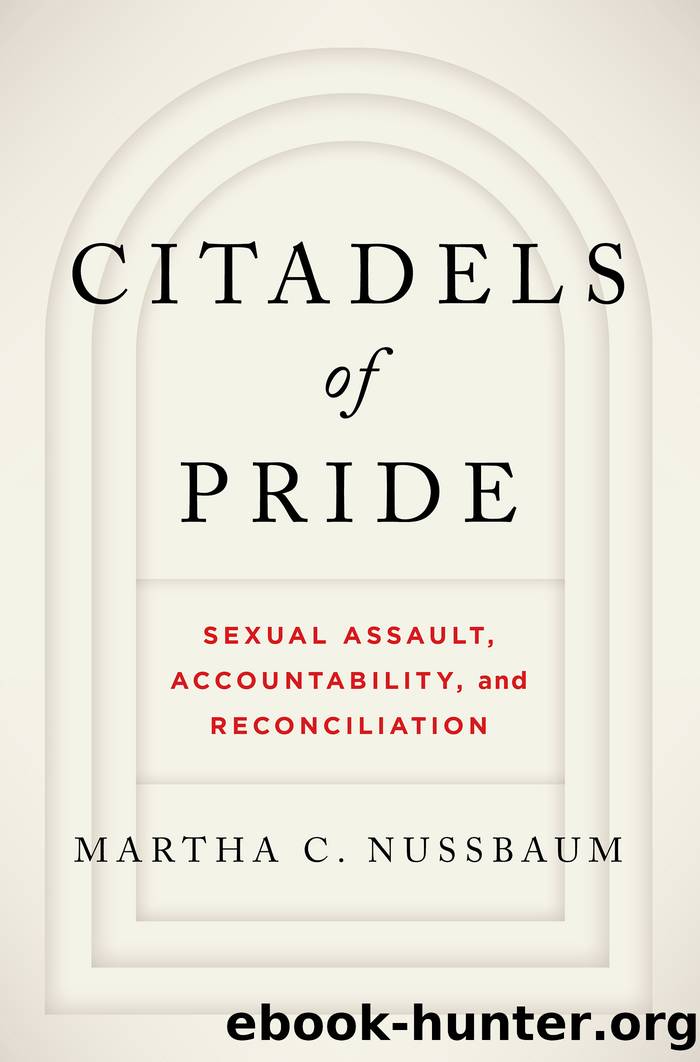Citadels of Pride by Martha C. Nussbaum

Author:Martha C. Nussbaum
Language: eng
Format: epub
Publisher: W. W. Norton & Company
Published: 2021-04-05T00:00:00+00:00
PART III
RECALCITRANT CITADELS:THE JUDICIARY, ARTS, SPORTS
Abuses of Power and Lack of Accountability
At last: Womenâs complaints of sexual assault and sexual harassment are serious business. Not everywhere and not with everyoneâconsider the failure to carry out a full investigation of allegations about Brett Kavanaugh during his Senate confirmation hearing, just as in the Clarence Thomas hearings in 1991. But the #MeToo movement has made great strides, shaping a public awareness of the ubiquity of these particular harms to women and the toll they take.
As weâve seen, this movement is by no means the creation of celebrity whistleblowers. Ordinary women and their lawyers have been raising their voices for decades, and their efforts have made great progress in shaping a legal culture in which womenâs allegations can be taken seriously, even if women do not always prevail. The multiplication of voices has begun to create a culture of confidence: if these courageous women are not afraid to come forward, many women have reasoned, then I, too, should be willing to speak out. The whole idea of #MeToo is one of solidarity in a demand for accountability. The hashtag #MeToo gives support to women: you donât have to stand out there alone; you stand with all of us, and we stand with one another in demanding justice.
The culture of #MeToo has been a tonic for our entire society, waking up anyone who will listen. It also brings some problems with it. All too often clear adjudication of womenâs accusations proves impossible because the alleged wrongs are long in the past. Often the statute of limitations prevents legal action; even where it doesnât, the lapse of years means a dearth of evidence. Usually there is no rape kit, and witnesses, if any, are often gone or have forgotten. This is bad news for the woman who makes the complaint, since it prevents her from pursuing justice. But it is also bad news for the accused, since the informality of these accusations means that there is no due process and, often, no thorough investigation. Even though the woman does not find justice, the man also can lose a great dealâa career, a livelihood, peace of mindâwith no recourse. Law, with its safeguards, is replaced by a culture of public shaming that people concerned with justice have endeavored for centuries to replace with the rule of law. Punishment by shame has its defenders today, but it has defects that Iâll address more fully in my Conclusion. Law is impartial, as a culture based on shame is not. And we should where possible rely on law to deter bad behavior, not on informal censure.
However, #MeToo also gives a powerful nudge to lawmakers and to the public in general: this behavior is bad, and it should incur some sort of sanction, whether criminal or civil. It also sends a message to institutions: make clear rules, if you havenât done so already, defining acceptable and unacceptable behavior, and enforce them fairly and without exception. By now we know that
Download
This site does not store any files on its server. We only index and link to content provided by other sites. Please contact the content providers to delete copyright contents if any and email us, we'll remove relevant links or contents immediately.
| Anthropology | Archaeology |
| Philosophy | Politics & Government |
| Social Sciences | Sociology |
| Women's Studies |
Cecilia; Or, Memoirs of an Heiress — Volume 1 by Fanny Burney(31332)
Cecilia; Or, Memoirs of an Heiress — Volume 3 by Fanny Burney(30934)
Cecilia; Or, Memoirs of an Heiress — Volume 2 by Fanny Burney(30889)
The Great Music City by Andrea Baker(21283)
We're Going to Need More Wine by Gabrielle Union(18072)
Bombshells: Glamour Girls of a Lifetime by Sullivan Steve(13108)
Pimp by Iceberg Slim(12931)
All the Missing Girls by Megan Miranda(12747)
Fifty Shades Freed by E L James(12450)
Norse Mythology by Gaiman Neil(11883)
Talking to Strangers by Malcolm Gladwell(11875)
Crazy Rich Asians by Kevin Kwan(8349)
Mindhunter: Inside the FBI's Elite Serial Crime Unit by John E. Douglas & Mark Olshaker(7833)
The Lost Art of Listening by Michael P. Nichols(6472)
Enlightenment Now: The Case for Reason, Science, Humanism, and Progress by Steven Pinker(6405)
Bad Blood by John Carreyrou(5768)
The Four Agreements by Don Miguel Ruiz(5510)
Weapons of Math Destruction by Cathy O'Neil(5036)
We Need to Talk by Celeste Headlee(4868)
